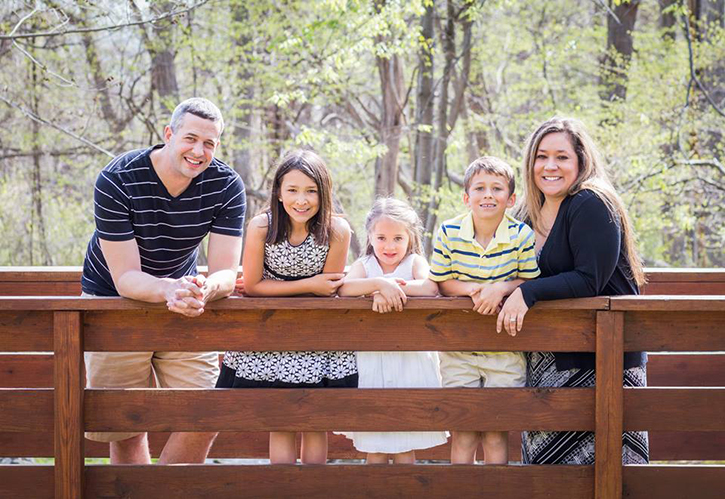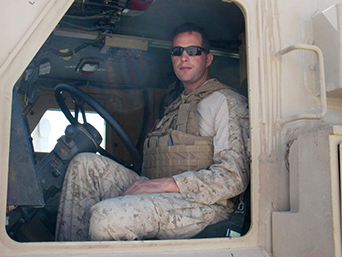
Matt Wilkes (left), U.S. Marine veteran and Mason student who is speaking at Volgenau School of Engineering’s degree celebration, is shown with his family: children Madison, McKinley and Tyler, and his wife Nicole Wilkes. Photo provided.
George Mason University’s Matt Wilkes is at the end of a mentally and physically challenging journey.
The 39-year-old graduation speaker from the Volgenau School of Engineering’s inaugural Cyber Security Engineering class has spent the past three years balancing full-time school, a family and part-time jobs.
It’s hardly been easy, but it beats getting shot at it or nearly killed by incoming mortar rounds exploding all around you, which he experienced during three combat tours during a 12-year stint in the U.S. Marine Corps that preceded his arrival at Mason.
And he’s persevered to tell about both.
“It’s always about hard work and dedication,” said Wilkes, who rose to the rank of sergeant before leaving the service. “What I learned in the Marine Corps is that you have a job, and you’re going to do your job. No matter how hard it is, it’s your responsibility.”
Wilkes enlisted following the Sept. 11, 2001, terrorist attacks and was on the ground for the initial invasion of Iraq in 2003. He added another tour in Iraq three years later in Ramadi before a final deployment to Afghanistan in 2010.
He was asleep in his vehicle one night during his first deployment when the sound of enemy mortars exploding around him jarred him from his sleep. When he jumped out of the vehicle, Wilkes twisted both ankles as he fell and was unable to find either his weapon or flak jacket. He crawled to a nearby foxhole, only to discover there was no available space as enemy shells continued to rain down all around him. Wilkes somehow emerged unscathed.
“It was by the grace of God that I survived,” he said.
After moving to Northern Virginia with his wife and their three children, Wilkes enrolled at Mason in spring 2015 to fulfill a promise to his late mother that he would get his degree. On the first day of classes, he quickly noticed how much things had changed when he pulled out a few notebooks in anticipation of taking notes, only to watch his younger and more technologically savvy classmates all whip out their laptops instead.
“When I first came here, I knew nothing about computers,” Wilkes said. “I could turn a computer on and off. I could surf the web, but I didn’t know any of the stuff that was involved with it.”
Determined to succeed, Wilkes threw himself into his studies with the same aplomb he brought to his service in the Marine Corps. Three active children at home meant staying up late to complete assignments and arriving on campus at 5 a.m. to study for a few hours before class. After school, he would help ferry his children to their various activities such as travel soccer and spend time with his wife.
The journey hasn’t been easy. Nicole Wilkes, his dedicated wife of 13 years, has held down three jobs while her husband has been a full-time student picking up odd jobs when he could to help make ends meet.
Wilkes admits that he was often exhausted and wondered at times if he’d make it through. He recalled similar excruciating mental and physical fatigue during the 13 grueling weeks he spent at boot camp at Parris Island.
“Every day, you had to push yourself at boot camp to make it one more day,” Wilkes recalled. “So you take it week by week, semester by semester just like boot camp.”
Peggy Brouse, the professor for Systems Engineering and Operations Research and the director of Mason’s Cyber Security Engineering Undergraduate Program, comes from a family steeped in military service and was impressed with the tenacity and strength she saw in Wilkes.
“Matt has just been amazing,” Brouse said. “He’s overcome a lot of things veterans go through and he’s been dealing with things that other students don’t have to deal with.”

Matt Wilkes, 39, has served three combat tours: two in Iraq, and one in Afghanistan, where this photo was taken in 2010. Provided photo.
Wilkes quickly got his feet under him in the nation’s first degree program dedicated to the global threat of cyber-terrorism. He graduates with a 3.89 GPA and was one of just two students to receive the program’s Distinguished Achievement Award.
His degree work focused on safeguarding existing financial networks, utility systems and lines of communications and building resilient new ones.
Wilkes hopes his story can serve as a testament to others that anything is possible.
“I hope they can look at me,” he said, “and say, ‘If he can do it after all he’s been through, then I can definitely do it as well.’"
